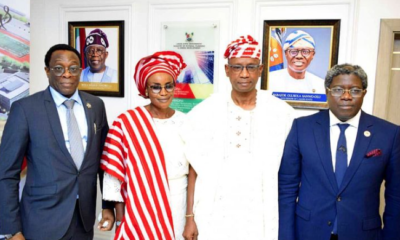Education
100 Days In Office: “Governor Nasir Idris Spent N2.5 Billion To Improve Primary, Secondary Education In Kebbi” – Commissioner


The Kebbi government has spent N2.5 billion to improve the standards of primary and secondary schools in the state.
Read Also: Miss Tourism, Joy Ekekwe Tasks Hoteliers On Marketing Nigerian Historical Sites
This was said by Halima Muhammad-Bande, the state’s commissioner for basic secondary education, in a Friday press conference in Birnin Kebbi.
She stated, “Within 100 days of Governor Nasir Idris taking office as the state’s governor, the state government has done its best in the area of education, as it was able to pay school meals of N1.8 million from May to July.
Additional payments include N55.6 million for improved boarding secondary school food and N20 million for the Basic Education Certificate Examination in 2023.
The government paid N20 million to finance the national conference conducted in Delta, and N5.4 million to host the Joint Consultative Council meeting in Makurdi, Ms. Muhammad-Bande continued.
The governor authorized the domestication of the National Assembly Act on the new retirement age for teachers, which was raised from 60 to 65 years old by birth and from 35 to 40 years of service, in addition to his commitment to modernizing the educational system, she said.
The governor, who had previously worked as a professional teacher, labor organizer, and governor who supported education, was familiar with the field of education, according to Ms. Muhammad-Bande.
“He has approved over N2.4 billion for the construction and renovation of schools in the 21 local government areas of the state since taking office barely three months ago,” she said.
Ms. Muhammad-Bande thanked the governor for helping teachers realize their aspirations and said it would improve their morale.
Education
Senate Confirms Minimum Age Requirement For Admission Into Universities


The Nigerian Senate has made it clear that the statements regarding the potential increase of the age limit to 18 years were individual viewpoints.
The Senate stressed that any adjustments to the age limit would require proper legislative procedures, whether they involve lowering or raising the limit.
Chairman of the Senate Committee on Media and Public Affairs, Adeyemi Adaramodu, made this known in an interview with journalists on Wednesday.
Read Also: FG Engages Russian Builders To Resuscitate Ajaokuta Steel
The Nigerian Senate has made it clear that the statements regarding the potential increase of the age limit to 18 years were individual viewpoints.
The Senate stressed that any adjustments to the age limit would require proper legislative procedures, whether they involve lowering or raising the limit.
Chairman of the Senate Committee on Media and Public Affairs, Adeyemi Adaramodu, made this known in an interview with journalists on Wednesday.
Recall that last week, Prof. Tahir Mamman, the Minister of Education, stated that the government is thinking about changing the minimum age for entering universities to 18 years old.
“Comment on the minimum age requirement for admission is not a law,” the lawmaker said.
“So it is just an opinion. It’s not a law. By the time the Senate resumes, whoever wants to bring that one out to make it a law, will now bring it and then the procedures will take place.
“You can bring whatever to the floor in form of a bill. When you bring it, there’s going to be public hearing.
“All the stakeholders will sit down and talk about it. The parents, teachers, legislators, civil society organisations, even foreign organisations.
“We will sit down and talk. Even if they say that the minimum age should be 30 or 12, we will all discuss it in an open forum. So it’s still a comment which cannot be taken to be the law.”
Education
Ned Nwoko Advocates Artificial Intelligence In Nigeria’s Educational System


The Senator representing Delta North Senatorial District at the National Assembly, Ned Nwoko, weekend, advocated for the inclusion of Artificial Intelligence (AI) in the nation’s educational system in a bid to embrace the new global technological order.
Read Also: ASUU-SSU Seek Sokoto Government’s Help
Ned Nwoko, who spoke at the launch of a book titled, ‘The Nigerian University System: The Downs Wings And Way Forward’ written by Professor Steve Okecha in Lagos, was represented by his Special Adviser on Media Strategy, Adeniyi Ifetayo.
The lawmaker lauded the intellectual sagacity and contributions of the author to the literary world.
While making a donation of N2million to the intellectual work of the academic, Ned Nwoko also expressed his commitment to the upliftment of lives of the people of his constituency through impactful projects.
He said, “Allow me to extend heartfelt gratitude on behalf of the very distinguished Senator Ned Ned Nwoko, who, due to his unyielding commitment to the welfare of his constituents and the advancement of society, sends his regards.
“Senator Ned Nwoko’s tireless dedication to various facets of human life, particularly education, health, sports, culture, and tourism, exemplifies his deep-seated passion for societal progress.
“Furthermore, his visionary initiative in establishing the Sports University of Nigeria, Idumuje, underscores his commitment to nurturing talent and fostering excellence in sports education within sub-Saharan Africa.
“As we embark on this literary journey, let us not only reflect on the issues laid bare within the pages of this book but also heed the call to action articulated by Professor Okecha.
“For it is through collective engagement and unwavering dedication, akin to the exemplary commitment demonstrated by Senator Ned Nwoko, that we shall realize the transformative potential of education and pave the way forward for our Nigerian University System.
“Thus, as the world goes into another technological phase, I believe that many of our schools should be able to embed artificial intelligence, AI, in many things they do, in terms of research and documentation.
“As the world trends toward AI, I strongly believe that the Nigerian education system should adopt this technological innovation so that the students can have the same standard as their contemporaries in Western countries,” he stated.
Education
FG Partners London School On School Feeding


The Nigerian Home Grown School Feeding Programme has got a boost with a partnership between the federal government and the Partnership for Child Development (PCD), Imperial College, London.
Read Also: FCCPC To Review Planned DStv, GOtv Subscription Hike
The senior special assistant to the president on the home-grown school feeding programme, Dr. Yetunde Adeniji, disclosed this at a workshop in Abuja.
Adeniji said the initiative was part of President Bola Ahmed Tinubu’s Renewed Hope Agenda, saying the workshop was to launch the Value for Money Study and seek to estimate the cost of the National Home Grown School Feeding Programme in order to reflect on its multi-sectoral benefits and its impact on socio economic as well as human capital development of the country.
The aide also stated that the objective of the study was to determine the effectiveness of the school feeding programme in improving student’s attendance and academic performance, pointing out the comparative analysis of the benefits of investing in school feeding and other education interventions in the country.
She revealed that the study would first be launched in Kaduna and Osun states and subsequently extend to the six geopolitical states across the country as well as the entire 36 states at the end of 2024.
-



 Entertainment1 year ago
Entertainment1 year agoThe Story Of A Woman With Unusual Long Backside, Sarah Baartman
-



 Entertainment1 year ago
Entertainment1 year agoTallest Man In Nigeria Afeez Agoro Cries Out To Nigerians For Financial Support After Chronic Arthritis Diagnosis As SFCOBA 94Set Pays Him Visit
-



 Business2 years ago
Business2 years agoNigeria Vs Ghana: Authentic Nigeria Football and Allied Sports Supporters Club Seals Sponsorship Deal with 86Z Football Technology Limited Foots
-



 Education2 years ago
Education2 years agoTokunbo Wahab: An uncommon legal eagle soaring daily to a greater place in history
-



 News8 months ago
News8 months agoPhysical Planning Commissioner, Oluyinka Olumide Assumes Office …Harps On Transparency, Zero Tolerance To Building Collapse
-



 Featured1 year ago
Featured1 year agoBuruj Football Club’s Players Moving To Europe Delights Obesere
-



 Sports11 months ago
Sports11 months agoVictor Osimhen Returns To Roots As Football Superstar Visits Primary School And Inspires Young Talent
-



 Featured2 years ago
Featured2 years agoQatar 2022 World Cup Playoff: Black Stars Hold Eagles To Scoreless Draw In Kumasi




